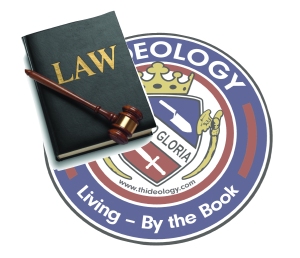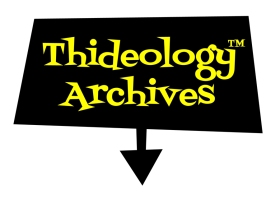Lord of the Law: Part I
February 27, 2009 8 Comments
God’s Law
Whenever “law” is discussed in a Christian or religious context the mind is immediately drawn to the Mosaic Law, the Ten Commandments, and the Old Testament — and rightfully so. For it is in the Law, as expressed in the Bible, where we find the heart of God. It is there we see an expression of what it means to be holy.
 But it is important to understand God’s Law transcends even the Old Testament Mosaic Law. Since God is creator of all things, and sovereign over them, His law can be found in “Natural Law” as well. It can be found in what is sometimes referred to as “Common Law.” His fingerprints are all over every law that is just, and is designed to do only that which God has authorized it to do. We will discuss such laws further a little later. For now let’s focus on the Mosaic Law.
But it is important to understand God’s Law transcends even the Old Testament Mosaic Law. Since God is creator of all things, and sovereign over them, His law can be found in “Natural Law” as well. It can be found in what is sometimes referred to as “Common Law.” His fingerprints are all over every law that is just, and is designed to do only that which God has authorized it to do. We will discuss such laws further a little later. For now let’s focus on the Mosaic Law.
So, what is the purpose of the Law as expressed in the Bible? Is it a guide for proper living?
Yes.
Is it the standard by which we are measured?
Yes — with a caveat.
God gave it to us with the full knowledge that we can’t keep it.
You may be asking, “Do you mean to say that God gave us rules He already knew we could not keep?”
Yep.
“And then holds us accountable for not keeping them?”
Yep.
I know, I know — that just doesn’t seem fair. But do you want to be the one who calls God out on this? Remember, Job questioned God once about the “fairness” of his circumstances — and God responded with a Holy verbal smack down that took two entire chapters (Job chapters 38 and 39) to complete. Job learned his place. We should, too. God is not accountable to us — we are accountable to Him.
Besides, it isn’t as though humanity was an innocent bystander in history, doing a pretty descent job of pleasing God, when all of a sudden — BOOM — God dropped the hammer of the Law on us to trip us up. Oh no. We’d screwed things up long before God gave us the Law.
 Think about it. Cain murdered Abel in Genesis chapter 4. You don’t think that it was okay with God that Cain killed his brother simply because the Law had not yet been given, do you? I mean, the Law doesn’t show up until Exodus chapter 20. There’s a HUGE chunk of time wedged between Cain’s crime and the introduction of the Law. Did that mean Cain was off the hook? Of course not.
Think about it. Cain murdered Abel in Genesis chapter 4. You don’t think that it was okay with God that Cain killed his brother simply because the Law had not yet been given, do you? I mean, the Law doesn’t show up until Exodus chapter 20. There’s a HUGE chunk of time wedged between Cain’s crime and the introduction of the Law. Did that mean Cain was off the hook? Of course not.
It was murder. And what’s more, Cain knew it. When God asked Cain where his brother was Cain deflects the question, “I do not know; am I my brother’s keeper?” Were he completely ignorant of the evil he had done he would have answered with something like, “Sure, he’s buried over there. Why do you ask?”
But he doesn’t. He lies in an attempt to escape the consequences of his action. An action he already knew was wrong — even without the Law. And God held him accountable for the crime. He passes judgment on Cain and sentences him…
“And now, you are cursed from the ground, which has opened its mouth to receive your brother’s blood from your hand. When you work the ground, it shall no longer yield to you its strength. You shall be a fugitive and a wanderer on the earth.” — Genesis 4:11-12
So, in Genesis chapter 4 we have a crime, a judgment, and a sentence — so why in the world did God give us the Law? If he already knew we couldn’t keep it; if we were already guilty before Him; if we already had some notion about right and wrong; why give us the Law? What is its purpose?
Answer: To show us the standard by which we are measured and to show us our need for grace. Without the Law we have a tendency to measure ourselves against ourselves, which is a method that makes us appear to be better than we actually are — at least in our own eyes.
Without the Law we’d continually measure ourselves against the worst elements of humanity. When confronted with the fact we’ve stolen something our reaction would be, “Well hey, at least I didn’t murder someone, like ol’ Cain did over there.”
It’s in invalid defense and an inaccurate comparison. WE are not the standard. God is the standard.
“You have heard that it was said, ‘You shall love your neighbor and hate your enemy.’ But I say to you, Love your enemies and pray for those who persecute you, so that you may be sons of your Father who is in heaven. For he makes his sun rise on the evil and on the good, and sends rain on the just and on the unjust. For if you love those who love you, what reward do you have? Do not even the tax collectors do the same? And if you greet only your brothers, what more are you doing than others? Do not even the Gentiles do the same? You therefore must be perfect, as your heavenly Father is perfect.” — Matthew 5:43-48
Jesus specifically tells us that doing what others do is no gauge of morality or righteousness. Moreover, He provides the proper standard by which we are to measure ourselves — God.
Okay, so we have the appropriate standard. We are to compare ourselves to God. How hard could it be, right?
Enter the Law.
Look at the Law. There is no way we can keep the whole thing. And Jesus even makes it harder because he points out that the right motives for keeping the Law are essential if you are to keep the Law. Do it out of obligation instead of love for the Father and you have transgressed. You’ve failed.
 We are entirely incapable of keeping the Law. We need grace. The Law shows us just how dire is our need for grace. In Romans chapter 7 Paul describes how it is the Law that shows our sin for what it truly is. It shows us our need for a mediator, someone to intervene on our behalf.
We are entirely incapable of keeping the Law. We need grace. The Law shows us just how dire is our need for grace. In Romans chapter 7 Paul describes how it is the Law that shows our sin for what it truly is. It shows us our need for a mediator, someone to intervene on our behalf.
We need a savior. We need Christ.
This is why God gave us the Law — to show us our complete inability to achieve His standard and our subsequent need for Jesus.
Now, it has been pointed out that not everyone was the recipient of God’s written Law. At first it was for the Jewish people only. Later, through the work of Christ, it was made available to Gentiles. But some may still ask, “How, then, is it that we find similar laws in cultures and countries where the Mosaic Law was never known? How did those people come to establish standards very near what God established in the Torah and yet they have no knowledge of the Torah?”
Good question.
We’ll take a look at that in Lord of the Law: Part II, Natural Law.







